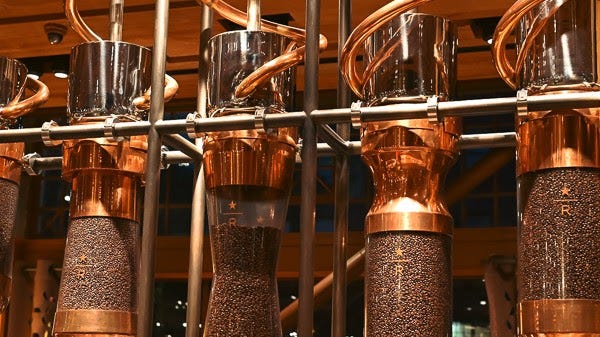Last week, my mom sent me an email that her friend (Aunt Isy) had forwarded to her. This email has been making the rounds from the looks of the forwards. Perhaps someone had forwarded it to you too. The subject line is "You Think Gasoline (PETROL) is expensive???" (clearly, this is an international chain letter), and the footer asks that you forward to email to at least one person. At first glance, I thought this was another cute meme floating around with its flashing GIFs, but upon further reflection, it helped me reveal some fundamental truths about the way we see value.
A gallon of gas has been oscillating between $4 and $5 in the US. In petrol places, that's not even very high, but it is here, and people are up in arms willing to vote out President Biden because the price of gas is so high (and other reasons, but that is a big one.) The email goes on the calculate the price of various items by the gallon. Diet Snapple (16oz $1.29) $10.32/gallon. Starbucks's Reg Coffee (16oz $2.10) $16.80/gallon, Brake Fluid (12 oz $3.15) $33.60 per gallon, Vick's Nyquil (6oz $8.35) $178.13/gallon and Evian Water (9oz $1.49) $21.19/gallon. Most of the items were bought on a whim, some provide important functions, and at least one could be obtained for nothing. By the way, gasoline at $5/gallon is less than $.04/oz.
I suspect that part of the reason we think that gas should be priced so much lower than soft drinks is that we have come to expect that is the price we pay and have designed our lives around cheap gas. In addition, we treat gas as a commodity, that one brand is essentially as good as another even though through additives and commercials, brands try to convince us otherwise. Stations list the product's price, and we choose the most convenient brand with the lowest price. If we considered the value of gasoline the way we do Starbucks coffee first thing in the morning, Nyquil when we have a head cold, or Evian... I'm not sure about Evian then we might treat it differently. We would use it more carefully and recognize its value as expressed in the price we are willing to pay or sacrifices we are willing to make (smaller cars?)
In life and leadership, we often experience the same cost/value calculus when dealing with people. The people who toil away every day, recently called essential workers, are paid the lowest wages, and when there is talk of increasing the price, there is a general cry that we cannot afford it, that the market deems it so, or they are not deserving. Like gasoline, they are the fuel that drives our economy, and we have become used to cheap energy and design out systems to operate that way. We compensate unique individuals with much higher salaries because they are more specialized and exist in smaller quantities. But if Evian water is worth 4 times as much as gas when it can be obtained for free in many places, how good are we at assigning the proper cost/value ratio?
This is not a screed on executive compensation. On the contrary, this email revealed that I am not ascribing enough value to the things I take for granted. Higher gas prices mean thinking differently about what trips are worth taking, which could have positive effects. Remembering to value the time you spend with the most important people to you even though you see them every day could be a game-changer. Seeing every person who has meaning to us, our business, and our life as having tangible value helps us make better choices about how we spend the most precious resource we have... time. When time becomes scarce, the actual value is revealed. In life and leadership, we must understand the value in all things and do our best to not take what we think of as commodities for granted. Keep alert to the signs, including a slightly clever email to remind us what things cost and how much we value them.
Come celebrate our Design the Life You Love-Virtual Tea #100!
Ayse Birsel is celebrating her Design the Life You Love Virtual Tea #100 with a big online party! The prolific, Jerusalem-born, New York-based artist Tamar Ettun will officiate the party by helping participants "trap" their inner demons! Some of the demons Tamar notes are—the demon of empathy and fatigue, the demon of toxic empathy, the demon of pandemic depression, the demon of guilt, the demon of loss, the demon of being overwhelmed, the demon of overthinking, the demon of doubt.
Ayse notes—"What a great way to recognize our demons and capture them at our #100, especially since we started these teas to immunize ourselves to the uncertainty and havoc created by COVID. Let's catch them to make more time and space for our superpowers—optimism, gratitude, generosity, open-mindedness, playfulness, and courage. Tamar will have everyone engage in a playful, experimental movement that considers how bodies move together and alone as an expression of healing. She will have participants go through a series of multi-sensory movements to uncover their demons and then use art to gather protective magic to trap them using incantation bowls, also known as devil-trap bowls.
Materials: Bring paper Writing utensils Scissors and tape A bowl for your incantations bowl Dress-code: Please wear comfortable clothes you can move and have fun. You can join Ayse’s Virtual Tea #100 on Wednesday, April 13, 2022, 5:00 PM - 6:00 PM EDT, using this link and to find out more click here
Caution Is Not Fear, It Is Data by Ruth Gotian in Forbes
We all want to grow and progress in our careers. Sometimes, circumstances, like the Covid pandemic, may lead to stalls and detours. Over time, they can block our internal desire to learn. Unlocking this potential in others is the sign of a great leader. However, leading a team works best when you can first lead yourself. The challenge is that we often do not know how to grow, where to start, how to search for new opportunities, and when to let go of ideas that are not fruitful. In her new book, Smart Growth, Whitney Johnson, ranked by Thinkers50 as one of the top management thinkers in the world unleashes the secrets behind personal and professional growth. It all starts with what Whitney Johnson refers to as the S Curve of Learning. Des Dearlove, co-founder of Thinkers50 shares, “No one understands the S Curve of growth better than Whitney Johnson. Smart Growth takes her previous work on individuals to another level, showing how organizations can nurture and grow their people in order to grow their business. Her ideas are insightful, practical, and extremely timely.”
With love and gratitude,
Scott












Scott, your article served as a reminder that value is perceptional. And the value we ascribe to life's activities is the determining factor per how good one's life is. Thanks for writing the article ...
Greg
Puts it all into perspective doesn't it? Thank you Scott, we take too many things in our lives for granted. Well done!